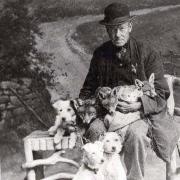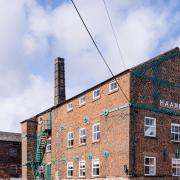Penelope Baddeley talks to Gloria Havenhand, aka 'Queen Bee', about her love of bees and sweet success at Troway Hall
Do you take honey in your coffee?’ asks Gloria Havenhand, as she buzzes about her kitchen at 17th century Troway Hall. I admit I don’t but enquire whether perhaps I ought to.
The 67-year-old scientist, beekeeper and lecturer insists that all of us should. Honey, she says, is foodstuff fit for the gods. It delivers an instant energy boost from its glucose content whilst its fructose content builds reserve energy, which is stored not as fat, but in the liver. Moreover, raw honey and other commodities from the hive have extraordinary healing properties and are the perfect panacea to relieve many common health problems.
Gloria’s own honey-taking habit, combined with that of a tendency to pop pollen by the spoonful at breakfast, may explain why she is a powerhouse of energy and drive, capable of running several companies simultaneously at an age when many people have retired.
As I sip the nectar-sweet coffee, Gloria manages to deal with a stream of telephone queries, hold a mini business meeting and organise a small workforce, which flies in and out of the kitchen, hovering about for instruction like so many worker bees.
‘I practically live from the hive, I bee-lieve in it,’ Gloria enthuses wildly, whilst rapidly refreshing her trademark red lipstick and confiding that she is known round these parts as QB (Queen Bee).
Troway Hall is home to one of two honey farms owned by Gloria in the beautiful North East Derbyshire Peak District. And it is here that the visitor finds the famous honey trail, which is open to the public and wends its way among 105 acres of unspoilt land. Part is designated as a Site of Special Scientific Interest and made up of ancient wild flower meadow, heather moorland, hedgerow and woodland. Gloria bought the place some 25 years ago, after a five year search to find the perfect land of milk and honey.
‘It was a dishevelled place, a remnant of peoples’ outstanding neglect – perfect beehive territory!’
‘Do you know we have lost 90 per cent of our hay meadows? But this place was like a wild forest when I found it. People had never used pesticides here and I knew it was just perfect for bees.’
Gloria inherited her love of bees from her herbalist grandmother, Martha, who lived around the mining area of Bolsover. Martha kept a hive in a neighbour’s garden, and wearing only a net curtain for protection, would gather honey and distribute it to ease whooping cough, TB and pneumonia among a community which could not afford to call the doctor. Gloria’s grandmother also used honey to dress the wounds of local miners.
‘The wounds would heal and she didn’t know why,’ said Gloria. ‘But as a biologist and a geneticist I do.’
Indeed a quick flick through Gloria’s fascinating book,
At the bottom of a daisy- and dandelion-bedecked incline, away from the clematis-covered house and hard by a hedge, the visitor can see the first row of innumerable terracotta coloured hives, which are the living hub of Gloria’s successful business, Medibee. (Beyond lies the Troway Hall fir tree nursery, where trees are harvested for Christmas and grace great stately homes including nearby Chatsworth and grand cathedrals round the UK and Europe.)
‘One hundred and five acres dedicated to bees and trees,’ Gloria waxes lyrical.
Medibee’s business year is inextricably linked with the behaviour of the bees, which swing into action in late spring, as the days begin to lengthen and the temperature increases. Millions of female worker bees gather nectar (and pollen) from the myriad of wild flowers and cornucopia of flowering plants to produce a variety of deliciously scented honeys. These are collected by Gloria and her small staff from the waxed honeycombs several times throughout the summer and then bottled, raw and unprocessed, still bursting with an array of vitamins, minerals, amino acids and bioflavonoids.
Gloria warns against buying over-processed supermarket honey, whose provenance cannot be traced due to heating processes which destroy the pollens and may be contaminated with cheap corn syrup.
‘Honey laundering is one of the biggest problems in the world,’ says Gloria. ‘Always seek out raw unprocessed honey. It is nature’s burst of energy. Good honey is not necessarily sparklingly clear. All of our honeys have a rim of nutrition around the top, a riot of pollen and wax, this indicates that a honey has not been filtered but comes to you just as the bee intended.’
Gloria’s bees first gather pollen from crocus and snowdrop and hazel catkins at the beginning of the year. And with nectar not yet being available she checks the honey reserves in the hive.
‘They make 150lbs of honey a year and we put 50lbs of this back to ensure they stay healthy. You should always give back to the hive.’
The bees’ first sip of nectar of each New Year comes from the humble dandelion, which Gloria champions as a saviour. ‘My grandmother taught me that the dandelion was the richest present in the world for bees because it is a lifeline, after their semi-asleep period through the winter. I recently drove past Bochum parkway and there were two big men on mowers cutting the dandelions and I wanted to go and lie down right in front of them. I would like to take dandelion cutters to the gallows!’
The dandelion, with its tiny composite florets, is the ideal recipient of the bee’s tiny 8mm proboscis. Each dandelion has two hundred tiny individual flower heads enabling the bee to fuel up at a single stop, conserving its energy.
Gloria is currently dispensing her own boundless energy in a one woman campaign to save the dandelion. This being in addition to her wider mission to ensure that the healing properties of honey and other hive produce become better known.
‘I have been on to councils all over Britain, to Sheffield, Chesterfield and Nottingham, telling them not to cut the dandelion because it is a lifesaver for the bee.’
Gloria’s concern for the bee’s welfare is timely. In the past ten years it is estimated we have lost 40 per cent of our bees thought to be due to the Varroa mite, which infests hives, causes Colony Collapse Disorder and attacks bees. Pesticides such as neonicotinoids, banned in France, Italy, and Germany but not the UK, have also taken their toll on the bee population.
As bees pollinate 40 per cent of all crops it seems that we ignore such issues at our peril.
‘Every botanist knows that crops such as spring onions, cabbage, and cauliflower are pollinated by the bee as well as apple trees, plum and cherry,’ said Gloria. ‘In fact Einstein believed that just four years without bees and the human population would be dead.’
Gloria’s adoration of the bee knows no bounds. Her ardour for the insect was not dampened even after an incident requiring her to jump fully clothed, bee-suited and booted, into a pond to escape stinging.
Devoted to their welfare, she has become attuned to their moods and can read their behaviour as a barometer, predicting weather patterns.
‘Bees are the best communicators in the world,’ she says. ‘A happy bee hums, a busy bee buzzes and when they get angry you can hear a roar in the valley, which means don’t come near me.’
Depending on the season, Gloria’s bees suck nectar (the thin sugar which they convert to honey) from plants as varied as bluebell to berberis. They gorge on everything from old English lavender to mint, fennel and cow parsley, hellebores and sedums. Medibee plants acres of phacelia at both Troway and its sister honey farm at Holmesfield because phacelia flowers through June and July when there is often a dearth of wild flowers. Gloria also sells phacelia to the public, as part of her campaign to urge us to grow bee-friendly plants in our beds and borders.
‘Phacelia produces the most wonderful pale lemon coloured honey. Real Fortnum and Mason stuff!’
Jewel in the crown of Gloria’s products is Troway’s famous Bio Active anti-bacterial honey, which is unique in the UK and rivals New Zealand’s famous Manuka honey.
Gloria points out that athletes training for our Olympics have made pilgrimages to her shop to buy whole batches of the stuff to aid their fitness regime. The dark and rich honey, strongly aromatic and of caramel flavour, is the result of the bountiful marriage between her trees and bees. From the end of summer when flowers become scarce the bees switch their attention to the tree resins and gums, which have strong natural anti-bacterial properties and give the spruce and fir their distinctive clean smell.
‘The bees collect it and line the hive with it to make their home sterile,’ says Gloria. ‘The beehive is the most sterile place on the planet.’ The resins infuse into the honey and bestow upon it a powerful anti-bacterial punch allegedly effective against everything from broken wounds, ulcers, digestive rumblings to everyday coughs and colds as well as inhibiting our modern super bugs. ‘It actually inhibits MRSA. You just can’t do better than that and the taste is awesome!’
A glorious aroma of rich fragrant honey is released as Gloria proudly opens the door to her shop, which is situated next to Troway Hall. The building resembles a little wooden hive stocked with nature’s bounty. The neat shelves are crammed with products made from the commodities of the beehive: including wax, propolis, royal jelly and pollen. ‘We tease out everything but the sting,’ says Gloria.
People from all over the world make a bee-line here to stock up from the rows of anti-bacterial honey and Troway Hall’s famous hedgerow honey. They buy health supplements, lotions and potions. Since the publication of Gloria’s book last year Troway and its shop have become something of a tourist attraction.
Bee pollen capsules are among the most popular products. ‘They are the best thing in the world for hay fever,’ says Gloria. ‘If people continue to take them throughout the summer months it desensitises them to pollen and there are no side effects. Bees don’t get hay fever!’
Propolis skin cream is a favourite with teenagers to combat spots and acne and Propolis Essence is popular to treat cold sores and bad throats. Jars of multi-coloured Pollen Sprinkles fly off the shelves.
Gloria raved: ‘Pollen is breast milk to baby bees and taken as a supplement it is high in calcium, high in iron and almost every amino acid known to man. You can sprinkle them on salads or ice-cream. My son Giles has them on his bacon sandwiches.’
Ah yes, just as Gloria inherited her grandmother’s passion for the bee, so this eccentric and inspiring businesswoman has bee-queathed her love of the hive to barrister son Giles. He is a regular helper at Troway, along with two tiny apprentices – Gloria’s grandchildren, aptly named Unity Bee and Phoebee.
It seems that there will be honey for tea at Troway for generations to come.
Honey Nature’s Golden Healer, will inform the reader that the simple sugar in honey sucks out water from bacteria and moulds, stopping it in its tracks. Honey’s acidic qualities also inhibit germ growth.
* Medibee’s Bio Active Anti Bacterial Honey is also available in the health and well-being aisle of Waitrose and Chatsworth Farm Shop.
* Honey Nature’s Golden Healer by Gloria Havenhand is published by Kyle Cathie Ltd. �12.99 Profits go to Sheffield Children’s Hospital.
* Visit www.medibee.co.uk


























